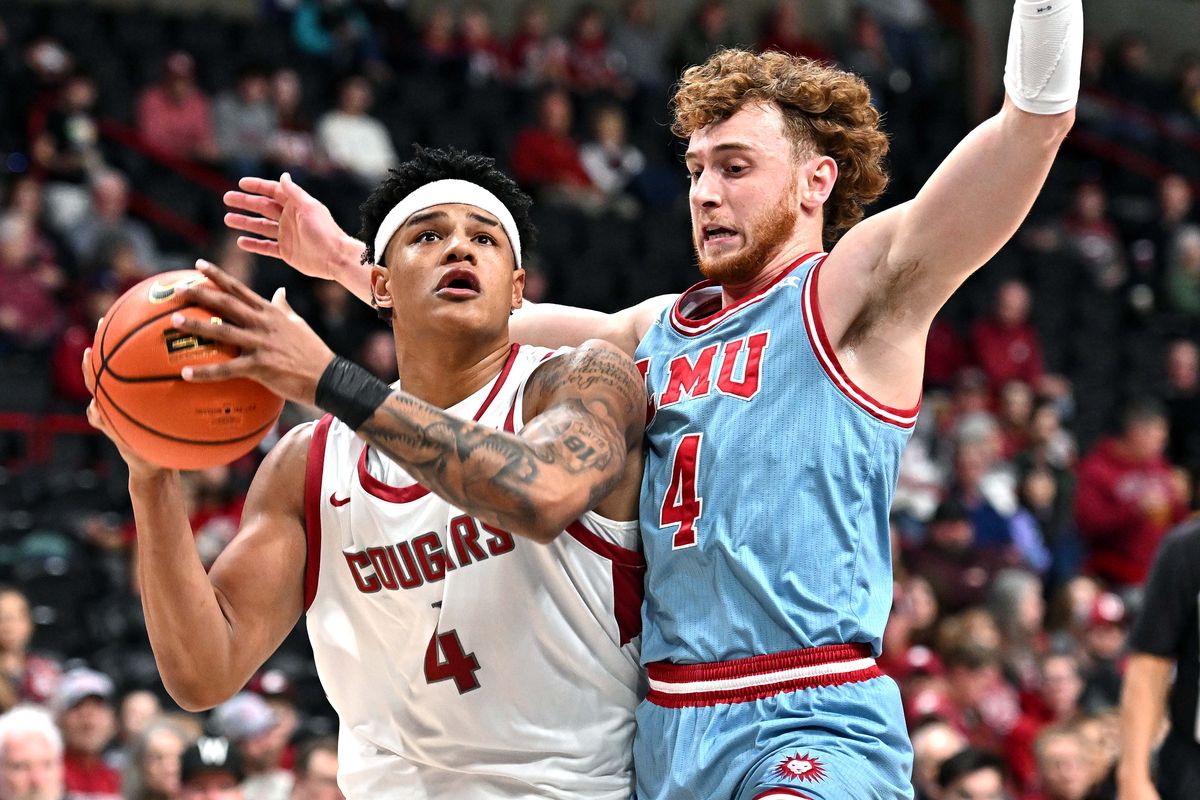WSU looks to run winning streak to four with home matchup against San Francisco
Washington State Cougars forward LeJuan Watts, left, goes up for a basket against Loyola Marymount Lions guard Will Johnston (4) in the first half on Mon. Dec. 30, 2024 at Spokane Veterans Memorial Arena in Spokane WA. (James Snook/For The Spokesman-Review)
PULLMAN – Every once in a while, when he’s trying to get his Washington State team hyped up right before a game, David Riley might pull out a note on the opponent.
He’ll point out that they’re ranked higher than the Cougars, pushing his guys to think about the stakes.
“But not really in practice or anything,” wing LeJuan Watts said.
Regardless of whether Riley has brought it up this week, WSU (12-3, 2-0 West Coast Conference) is looking at a key resume-building opportunity when San Francisco comes to town for a 4 p.m. tipoff on Saturday. The Dons (13-3, 3-0) are No. 60 in the NET rankings, making this a Quad 2 game for the Cougars.
WSU, which ended a 16-year NCAA Tournament drought with a second-round appearance last season, has a chance to bolster its resume with a win . USF, also No. 59 on KenPom, has put together a 13-3 season, including four consecutive wins.
The Dons are led by guards Malik Thomas and Marcus Williams, who are averaging 19.6 and 14.8 points, respectively. They also lean on freshman wing Tyrone Riley IV, who is averaging 10.4 points and 5.7 rebounds, plus center Carlton Linguard Jr. and guard Robby Beasley.
The Dons, who have won nine of their past 10, are No. 3 in the WCC in scoring defense, allowing opponents 65.3 points per game. They also have a turnover margin of plus-1.4, second in the conference, well ahead of the Cougs’ minus-3 – second to last in the conference. They might have an edge on WSU when it comes to being fundamentally sound.
Riley and the Cougars are focusing on ball security. With 15.3 turnovers per game, WSU ranks No. 343 nationally , underscoring how consistent an issue it has been all season. USF, as more opponents are doing, will look to exploit that.
“Really, really good at pressuring in the half court,” Riley said. “They’re gonna be physical. They blow everything up. They’re gonna try to turn us over.
“I think that’s gonna be our biggest challenge, handling their physicality on defense and limiting those two guards.”
In their past five games, the Cougars have hit 14 or more turnovers on four occasions: 18 in a win Monday over Loyola Marymount; 16 last week in a win over Portland; 12 in a win over Northern Iowa; 22 in a loss to Washington; and 14 in a win over Missouri State on Dec. 14, WSU’s last home game.
In some ways, turnovers are a byproduct of the motion system Riley runs.
With so much freedom on the court – to pass, dribble, shoot, often whatever players see fit – they become more prone to turning it over.
It’s the risk Riley runs with the system he plays. While his offense has flourished as one of the best in the WCC, it also comes with plenty of potential pitfalls – especially with so many key players out.
Four key cogs remain on the shelf for WSU: wing Cedric Coward (out for the season with shoulder injury), guard Isaiah Watts (out multiple weeks with a hand injury), wing Rihards Vavers (likely out for the season with broken hand bones) and guard Marcus Wilson (out for the season with shoulder injury). It’s forced Riley to shorten his rotations and ask more out of more players.
“What I’ve asked more of is just to be sharper in practice,” Riley said. “We don’t have the luxury of having long practices where we can mess up a few things, because we’ve got 10 guys that can practice, so every rep counts. We can’t skip any steps.”
If Riley took anything positive away from his team’s last outing, a win over LMU Monday in Spokane, it was the way the Cougs closed the game. In previous showings, they’ve let big leads slip and had to sweat things out, such as in their wins over Portland, Northern Iowa and Boise State last month.
But on Monday, when guard Nate Calmese found Watts for a fast-break alley-oop midway through the second half, the Cougars secured a double-digit lead. It never dwindled to single digits the rest of the way. In Riley’s view, that was no accident.
“I think that we’re learning how to talk to each other. I think that’s our biggest thing,” Riley said. “Guys will get frustrated when things go wrong. At some point during games, things are gonna go wrong. I think we show too much frustration throughout the season.
“We’re getting better at talking to each other and understanding and trusting that our teammates have our best interests, and the coaches have our best interests, and we can just listen, move on and focus on the game.
“I think we’re getting better at learning how to compete.”

